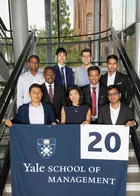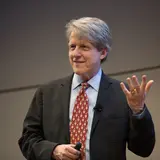
Master’s in Systemic Risk Class of 2020 Draws a Global Cohort
The new Master’s Degree in Systemic Risk class brings expertise and diversity to the classroom.
Students in the Yale School of Management’s Master’s Degree in Systemic Risk Class of 2020 began courses on August 28, bringing a mix of global expertise and viewpoints with them into the classroom.
The Master’s in Systemic Risk is a one-year, in-residence specialized course of study for employees of central banks and other major regulatory agencies who manage risk. The program is designed to give students from around the world a deeper understanding of managing systemic risk and responding to financial crises. The first-of-its-kind master’s program, which is intentionally kept small, launched in fall 2017.
The Class of 2020 includes 10 students. They began a weeklong orientation, alongside their classmates in Yale SOM’s Master of Advanced Management program and Master of Management Studies in Global Business and Society program, on August 21.
“We are delighted to welcome you,” program director Andrew Metrick told the new class at a deans’ welcome event. “You bring expertise and insight from economies and financial systems around the world.”
Metrick, who is the Janet L. Yellen Professor of Finance and Management and director of the Yale Program on Financial Stability, noted that the new class includes representatives from five of the world’s continents. The new students represent the Bank of Indonesia, Bank of Japan, Central Bank of Nigeria, Central Reserve Bank of Peru, Federal Reserve Bank of New York, Japan’s Ministry of Finance, and the Reserve Bank of India.
In all, a total of seven nationalities are represented. One of the students is dual-degree, pursuing both an Master’s in Systemic Risk and an MBA.
Over the course of the academic year, the Systemic Risk students will complete a slate of required courses focused on the global financial system. They will also take specialized elective courses, such as statistics, economics, and finance.
The new class boasts diverse accomplishments and experiences. The varied roles students have held include that of automotive engineer at Tata Motors and the first female president of her university’s debate association competing in many international tournaments. One student was a finance lecturer, while another worked for a boutique African-focused investment fund.



